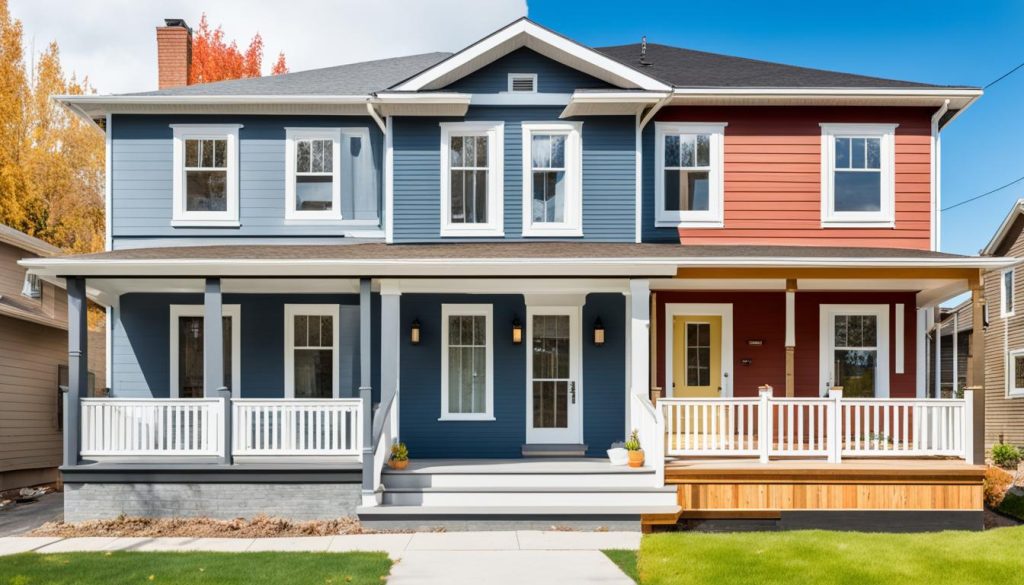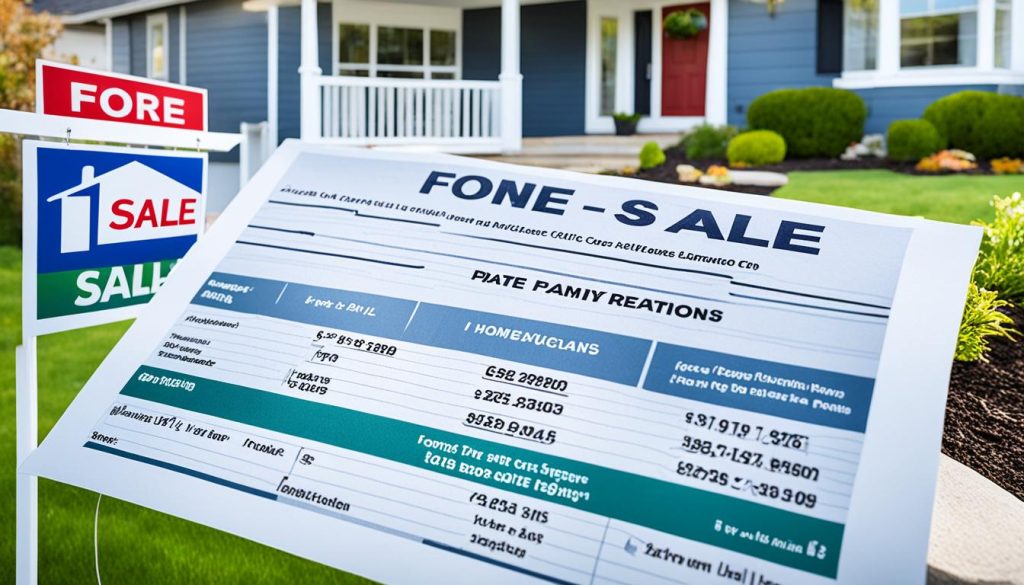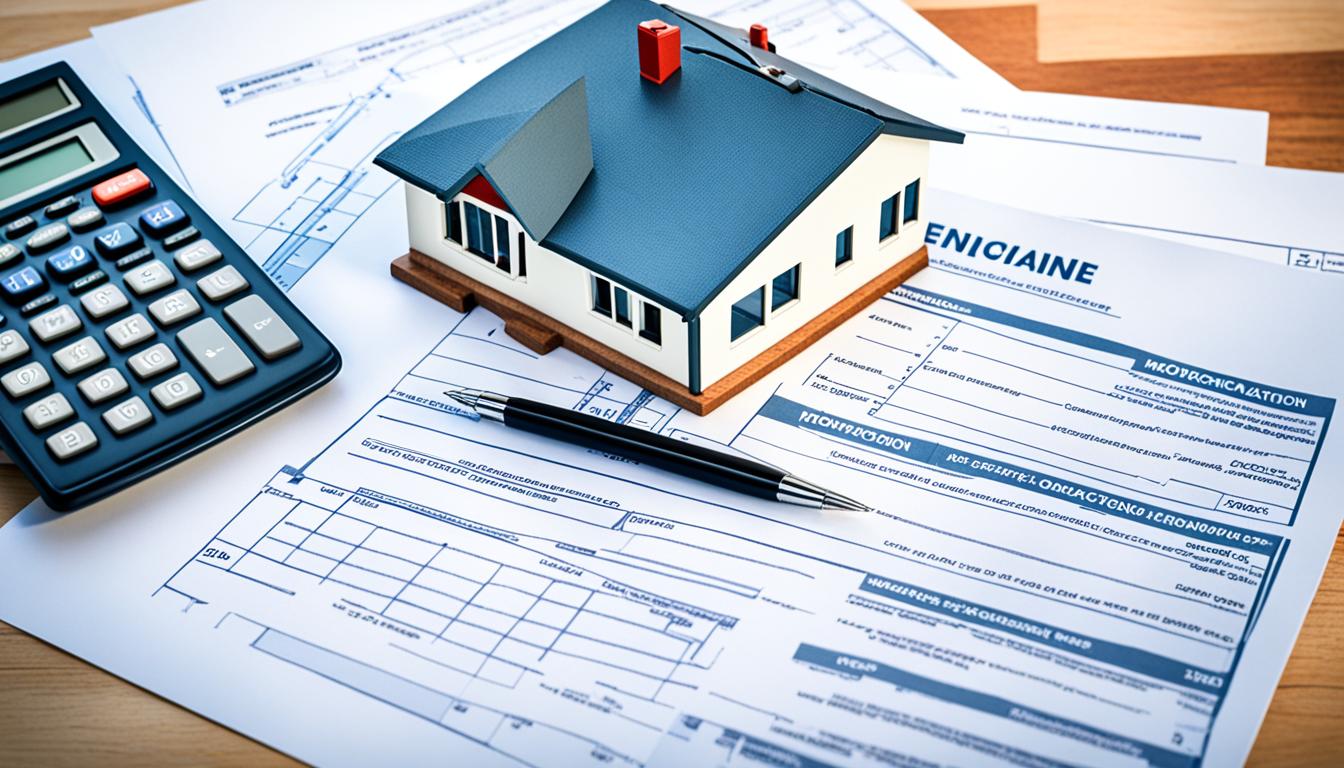Did you know that 44% of Canadians have either completed renovations or are planning to renovate in the near future? That’s a significant number of homeowners looking to improve their living spaces and increase the value of their properties. If you’re one of them, you may be wondering how to finance your renovation costs and make your dream home a reality.
Key Takeaways:
- Adding renovation costs to your mortgage can be a convenient way to finance your home upgrades.
- Options like mortgage refinancing and purchase plus improvement mortgages allow you to include renovation costs in your mortgage.
- Renovation mortgage loans often come with lower interest rates and higher loan amounts compared to other financing options.
- Existing homeowners can consider mortgage refinancing, home equity lines of credit, or personal loans to fund their renovation projects.
- It’s important to consider your budget, repayment capabilities, and potential government financial assistance when choosing the right financing option for your renovations.
Types of Renovation Financing Options
When it comes to financing your renovations, there are several options to consider. One option is to refinance your mortgage to access the equity needed for minor renovations. If your current mortgage balance is below 80% of the market value of your home and your income supports a larger mortgage amount, you may qualify for a refinance with additional funds.
Another option for financing renovations is a purchase plus improvement mortgage, which allows you to purchase a home and include the renovation costs in your mortgage. This option is especially useful for buying a fixer-upper.
By combining your home purchase and renovation financing, you can simplify the process and have a single mortgage payment that covers both. This can be an attractive option if you’re looking to buy a property that requires significant renovations.
Before deciding on a financing option, it’s important to carefully assess your financial situation and consult with a mortgage specialist to determine the best solution for your needs. They can guide you through the application process and help you understand the terms and conditions associated with each financing option.
Keep in mind that there may be specific requirements and limitations when it comes to adding renovation costs to your mortgage. It’s crucial to discuss these details with your lender or mortgage professional to ensure you meet all the necessary criteria.
Next, let’s explore the benefits of choosing a renovation mortgage loan and how it differs from other financing options.
Benefits of Renovation Mortgage Loan
Opting for a renovation mortgage loan offers several benefits. First, it often comes with lower interest rates compared to other financing options like home equity loans or personal loans. This means that you can save money in the long run by paying less interest on your loan.
Additionally, the loan amount for a renovation mortgage can be higher depending on your home equity. This makes it a good choice for more extensive renovation projects that require a significant investment. Whether you’re planning to remodel your entire kitchen or add a new room to your home, a renovation mortgage loan can provide the financial support you need.
One of the key advantages of a renovation mortgage loan is that it provides a structured repayment plan. Unlike credit lines or credit cards where the repayments can be flexible and unpredictable, a renovation mortgage loan allows you to plan your finances effectively. You’ll have a clear understanding of your monthly payments, making it easier to budget and manage your expenses.
By choosing a renovation mortgage loan, you can access the funds you need to transform your home without compromising your financial stability. With lower interest rates, higher loan amounts, and a structured repayment plan, this financing option offers peace of mind and flexibility for your renovation project.
Comparison of Renovation Loan vs Home Equity Loan
| Factors | Renovation Loan | Home Equity Loan |
|---|---|---|
| Interest Rates | Lower | Higher |
| Loan Amount | Higher (based on home equity) | Lower (limited to available equity) |
| Repayment Structure | Structured | Flexible |

As shown in the table above, a renovation loan generally offers lower interest rates compared to a home equity loan. Additionally, the loan amount for a renovation loan can be higher, depending on your home equity, while a home equity loan is limited to the available equity in your home. Moreover, a renovation loan provides a structured repayment plan, ensuring that you can effectively manage your finances.
Financing Options for Existing Homeowners
As an existing homeowner, you have several financing options to consider when it comes to funding your home renovation costs. Whether you’re looking to make minor updates or embark on a major renovation project, exploring these options can help you find the right solution for your needs.
One popular financing option is mortgage refinancing. With mortgage refinancing, you can borrow additional funds against the equity you’ve built in your home. This allows you to take advantage of lower interest rates and potentially change the conditions of your mortgage. By refinancing, you can consolidate your existing mortgage and renovation costs into a single mortgage payment.
Another option to consider is a home equity line of credit (HELOC). A HELOC is a revolving line of credit that allows you to borrow funds at a low-interest rate based on the equity you’ve accumulated in your home. This option provides you with the flexibility to access funds as needed, making it ideal for ongoing renovation projects.
If you’re planning smaller renovation projects, you can explore personal lines of credit or personal loans. These options provide you with a lump sum of money to cover your renovation costs, and they typically have a fixed interest rate with a structured repayment plan.
When choosing between these financing options, consider factors such as interest rates, repayment terms, and the overall cost of borrowing. It’s important to assess your financial situation and choose the option that best aligns with your needs and future goals.

| Financing Option | Key Features | Considerations |
|---|---|---|
| Mortgage Refinancing | – Lower interest rates – Potentially change mortgage conditions – Consolidate existing mortgage and renovation costs |
– May have closing costs – Requires qualification based on equity and income – Some limitations on the amount you can borrow |
| Home Equity Line of Credit (HELOC) | – Low-interest rates – Access funds as needed – Flexible repayment options |
– Variable interest rates can increase – Requires qualification based on equity and income – May have annual fees or other costs |
| Personal Lines of Credit/Loans | – Fixed interest rate – Lump sum of money for renovation costs – Structured repayment plan |
– May have higher interest rates compared to other options – Limited borrowing capacity for larger projects |
Additional Considerations and Resources
When financing your renovations, it’s essential to consider your budget and ensure that you can comfortably repay the debt. It’s also important to have an emergency fund in case of unexpected expenses.
Additionally, you may be eligible for government financial assistance or tax credits for eco-friendly renovations. Checking with your local government and utility companies can provide insight into available subsidies and rebates. These programs are designed to support homeowners in making energy-efficient improvements to their homes while reducing their environmental impact.
Consulting with a mortgage specialist can help you navigate the various financing options and choose the best solution for your renovation project. They can provide personalized advice based on your financial situation and renovation goals, ensuring that you make informed decisions about your home upgrades.

Leave a Reply
You must be logged in to post a comment.